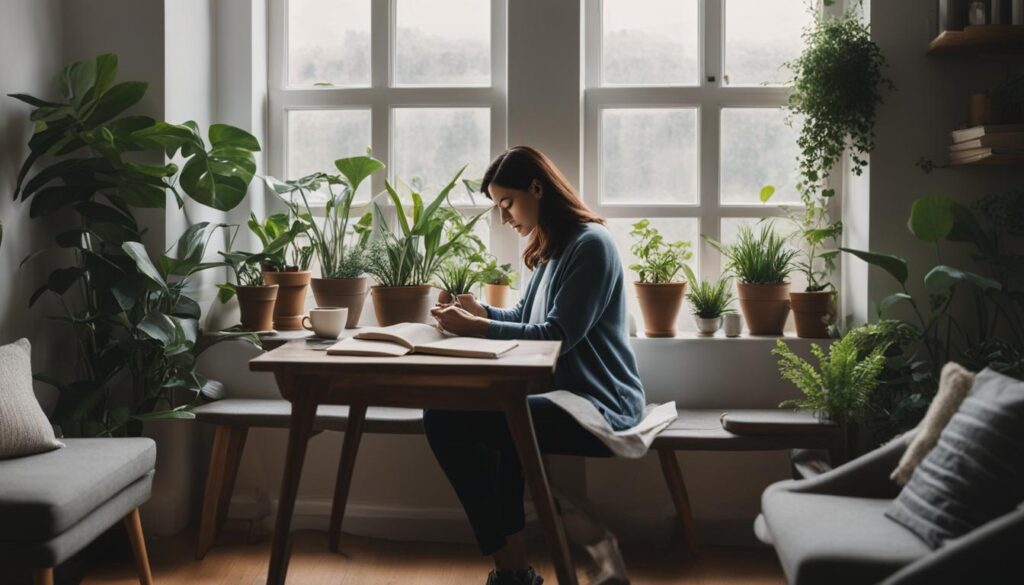Self-care for Introverts: Finding Solitude in a Busy World
Welcome to our article series on self-care for introverts. In a world that often feels overwhelming to introverts, prioritizing self-care becomes crucial. Today, we will explore practical tips and ideas for introverted individuals to practice self-care, find moments of solitude, and navigate their well-being in a busy world.
Being an introvert doesn’t mean missing out on self-care. In fact, self-care activities tailored to introverted needs can be incredibly beneficial for mental and emotional balance. From embracing mindfulness to setting boundaries, introverts can find solace and recharge their energy in their unique way.
Throughout this series, we will delve into various practices, such as prioritizing alone time, embracing mindfulness and meditation, setting firm boundaries, cultivating self-compassion, and learning the power of saying ‘no.’ We will also explore the importance of engaging in solo hobbies and how self-care can help introverted individuals thrive in a bustling world.
Are you ready to discover effective self-care strategies specifically designed for introverts? Let’s dive in!
Prioritize Your Alone Time
For introverts, making time for solitude is a crucial aspect of self-care. It provides an opportunity to recharge and reconnect with oneself, away from the demands of the outside world. Prioritizing alone time allows introverts to nurture their inner peace and replenish their energy reserves.
Engaging in solo activities can be as simple as taking a quiet walk in the morning or savoring a cup of tea in the evening. These moments of undisturbed tranquility create pockets of calm in an otherwise chaotic world, enabling introverts to slow down, reflect, and focus on what truly matters in the present moment.
Introverts often thrive in quiet and reflective environments, where they can engage in activities that align with their natural inclinations and recharge their energy levels. Prioritizing alone time is a self-care practice that honors introverts’ need for solitude and allows them to live authentically.
Whether it’s journaling, reading, practicing yoga, or pursuing a passion project, introverts can choose activities that resonate with their inner selves. These moments of solitude foster introspection, self-awareness, and personal growth, ultimately contributing to their overall well-being.
“In the midst of solitude, introverts find the quiet space where creativity thrives and their souls come alive.” – Anonymous
Introverts understand the power of alone time and use it as a means to nurture their well-being. By consciously prioritizing solitude, introverts can set boundaries, reduce stress, and find balance in their lives.
Benefits of Prioritizing Alone Time for Introverts:
- Recharges and revitalizes energy levels
- Promotes introspection and self-reflection
- Enhances creativity and problem-solving abilities
- Reduces stress and promotes relaxation
- Improves focus and attention
- Allows for personal growth and self-discovery
Prioritizing alone time is a powerful self-care practice for introverts. It provides the space for introspection, self-renewal, and personal growth, enabling introverted individuals to navigate the world with greater resilience, authenticity, and inner strength.
Embrace Mindfulness and Meditation
When it comes to introvert self-care strategies, embracing mindfulness and meditation can be incredibly beneficial. These practices allow introverted individuals to quiet their busy minds and soothe their overloaded senses, promoting a sense of calm and well-being.
Engaging in mindfulness involves bringing awareness to the present moment, focusing on one’s thoughts, feelings, and sensations without judgment. By redirecting attention to the here and now, introverts can find peace amidst the chaos of everyday life.
Meditation, on the other hand, provides a dedicated space for introverts to practice stillness and cultivate a sense of inner peace. By setting aside a few minutes each day to sit quietly, focusing on deep breathing and calming racing thoughts, introverted individuals can experience profound mental and emotional benefits.
“In today’s fast-paced world, embracing mindfulness and meditation can provide introverts with a much-needed respite. These practices not only help calm the mind and body but also enhance self-awareness and promote a greater sense of overall well-being.”
Studies have shown that regular mindfulness and meditation practice can reduce stress, anxiety, and depressive symptoms, while improving focus, creativity, and emotional resilience.
Benefits of Mindfulness and Meditation for Introverts:
- Decreased stress and anxiety levels
- Improved focus and concentration
- Enhanced emotional well-being
- Increase in self-awareness
- Greater capacity for empathy and compassion
By incorporating these self-care practices into their daily lives, introverted individuals can navigate the world with more ease and find solace in moments of mindfulness and meditation.
Tips for Getting Started with Mindfulness and Meditation:
- Create a dedicated space: Designate a quiet area in your home where you can practice mindfulness and meditation without distractions.
- Start small: Begin with just a few minutes of meditation each day, gradually increasing the duration as you become more comfortable.
- Focus on your breath: Pay attention to the sensation of your breath as you inhale and exhale, using it as an anchor to bring your attention back to the present moment.
- Stay consistent: Incorporate mindfulness and meditation into your daily routine to establish a regular practice and reap the long-term benefits.
- Explore guided meditations: Use apps or online resources that offer guided meditation sessions to help you navigate your practice if you’re new to the concept.
Remember, self-care practices for introverted individuals are highly personal, and it’s important to discover what works best for you. Embracing mindfulness and meditation can be transformative, allowing you to cultivate a greater sense of inner peace and well-being.
| Benefits of Mindfulness and Meditation for Introverts |
|---|
| Decreased stress and anxiety levels |
| Improved focus and concentration |
| Enhanced emotional well-being |
| Increase in self-awareness |
| Greater capacity for empathy and compassion |
Set Firm Boundaries
Establishing clear and firm boundaries is crucial for introverted individuals to protect their personal space and time. As introverts thrive in solitude, having boundaries allows them to create a self-care routine that honors their need for alone time and recharge.
Communicating these boundaries with confidence and clarity is key. It allows introverts to prioritize their well-being and ensure they have the necessary alone time they need to recharge and rejuvenate.
“Setting boundaries is an act of self-care. It allows introverts to protect their energy and create the space they need for self-reflection and growth.”
By clearly expressing their limits, introverts can avoid feeling overwhelmed or drained by social interactions and external demands. This self-care practice enables introverts to strike a balance between their own needs and engaging with the world around them.
Setting firm boundaries not only benefits introverted individuals but also promotes healthier relationships. It encourages others to respect their needs and creates an environment that values and understands the importance of self-care for introverts.

Understanding the significance of boundaries and implementing them in daily life allows introverts to create a self-care routine that supports their well-being and helps them navigate the world with greater ease.
Cultivate Self-Compassion
In a world that values perfection, introverts should grant themselves the grace to be human. Cultivating self-compassion involves drowning out the inner critic and showering oneself with kindness and encouragement. Recognizing that one’s best is more than enough is an essential aspect of self-care for introverts.
Self-compassion is the art of treating yourself with the same kindness, care, and understanding that you would give to a friend. For introverts, who often carry the weight of self-expectations and judgment, practicing self-compassion becomes even more crucial.
Instead of succumbing to self-criticism, introverts can learn to embrace self-compassion as a powerful tool for self-care. By nurturing a compassionate mindset, introverts can silence their inner critic and cultivate a more nurturing and supportive relationship with themselves.
This practice begins with acknowledging that perfection is an unrealistic standard to strive for. Embracing your flaws, imperfections, and vulnerabilities allows you to embrace your authentic self. You don’t have to pretend to be someone you’re not or meet the expectations of others.
Self-compassion also involves taking care of your own emotional and physical needs. This means making time for self-care activities that rejuvenate and replenish your energy. Whether it’s taking a long bath, indulging in a good book, or practicing meditation, find what brings you joy and allows you to connect with yourself.
Benefits of Self-Compassion for Introverts
When introverts cultivate self-compassion, they experience numerous benefits:
- Reduced stress and anxiety levels
- Improved self-confidence and self-esteem
- Enhanced emotional well-being
- Increased resilience and ability to bounce back from setbacks
- Improved relationships with others
- Greater self-acceptance and self-love
Self-compassion allows introverts to approach challenging and overwhelming situations with kindness and understanding. It helps them navigate social interactions, set healthy boundaries, and honor their own needs and limits.
Self-compassion is not a luxury, but a necessity for introverts navigating a world that often undervalues the power of solitude and self-reflection.
Cultivating self-compassion takes time and practice, but it is a skill that introverts can develop and strengthen over time. Be patient with yourself and remember that self-compassion is a journey, not a destination.
| Self-Compassion Practices for Introverts | Benefits |
|---|---|
| Positive Self-Talk | – Boosts self-confidence – Enhances self-esteem |
| Mindfulness Meditation | – Reduces stress and anxiety – Increases emotional well-being |
| Self-Care Activities | – Promotes self-nurturing – Replenishes energy levels |
| Journaling | – Enhances self-reflection – Fosters self-awareness |
Remember, self-compassion is not selfish or indulgent. It is an essential part of self-care for introverts. By cultivating self-compassion, introverts can thrive in a world that often undervalues the power of solitude and self-reflection.
https://www.youtube.com/watch?v=yqwG7fWVRPg
Learn to Say ‘No’ More Often
As introverts, it’s essential to prioritize self-care by learning to say ‘no’ more often. Politely declining invitations and requests that don’t resonate with us allows us to create more space in our lives for what truly matters. By setting boundaries and protecting our energy, we can focus on activities and relationships that nourish our introverted souls.
Saying ‘no’ may initially feel uncomfortable, but it is a liberating practice that empowers us to prioritize our own well-being.
By saying ‘no’ to social commitments that drain us, we create more opportunities for self-care activities that recharge our introverted energy. Whether it’s enjoying a peaceful evening at home with a book or taking a solitary walk in nature, honoring our need for solitude allows us to recharge and find inner peace.
“No is a complete sentence.”
Explore Solo Hobbies
Engaging in solo hobbies is like a soothing balm for introverted souls. These activities offer respite from the outside world and allow introverts to recharge. Whether it’s painting, gardening, or simply enjoying a country walk, introverts should prioritize activities that bring them joy and help them connect with themselves.
“Solo hobbies provide introverts with the perfect opportunity to find solace and recharge their energy. Engaging in these activities allows introverts to create their little retreat from the chaos of the world and reconnect with their true selves.” – Laura Davis, introvert and self-care advocate
When it comes to self-care practices for introverts, solo hobbies play a crucial role. These activities provide a sense of calm, allowing introverts to escape the demands of social interactions. By pursuing their favorite hobbies, introverts can nurture their creativity, reduce stress levels, and find solace in their own company.
Benefits of Solo Hobbies for Introverts
Exploring solo hobbies offers several benefits for introverts:
- Recharging Energy: Solo hobbies provide a much-needed break from external stimuli, enabling introverts to recharge their energy and regain mental clarity.
- Cultivating Creativity: Engaging in creative solo hobbies like painting or writing allows introverts to express themselves freely and foster their imagination.
- Reducing Stress Levels: Immersing oneself in an enjoyable activity helps introverts relax, release tension, and alleviate stress.
- Finding Inner Peace: Solo hobbies create a space for introspection and self-reflection, aiding introverts in finding inner peace and tranquility.
- Nurturing Personal Growth: Pursuing solo hobbies provides an avenue for personal growth, as introverts can challenge themselves, learn new skills, and develop their passions.
It’s important for introverts to carve out dedicated time for their solo hobbies as part of their self-care routines. By embracing these activities, introverts can find balance, recharge their energy, and maintain their sense of well-being.
| Activity | Benefits |
|---|---|
| Painting | Enhances creativity, promotes relaxation, and allows self-expression. |
| Gardening | Boosts mood, reduces stress, and provides a connection with nature. |
| Reading | Offers escapism, stimulates the imagination, and fosters personal growth. |
| Writing | Allows self-reflection, boosts creativity, and promotes emotional well-being. |
| Photography | Cultivates mindfulness, encourages exploration, and captures meaningful moments. |

The Importance of Self-Care for Introverts
Self-care is not an indulgence for introverts but a necessity. Taking care of their well-being allows introverts to navigate the world with more grace and shine brighter. It’s important for introverts to recognize their strength and wisdom and prioritize self-care to maintain their mental and emotional balance.
Introverted individuals often find themselves drained and overwhelmed by the constant stimulation and demands of the extroverted world. Engaging in self-care practices tailored to their unique temperament can help introverts recharge, rejuvenate, and stay in touch with their authentic selves.
Self-care for introverts goes beyond mere pampering or relaxation. It involves creating a holistic routine that nourishes the mind, body, and soul. By prioritizing self-care, introverts can cultivate resilience, foster inner peace, and build a strong foundation for their overall well-being.
Here are some essential self-care practices for introverts:
- Create a Sacred Space: Designate a peaceful and quiet area where you can retreat and recharge. Fill it with items that bring you comfort and joy, such as books, soft blankets, and scented candles.
- Practice Mindful Meditation: Set aside time each day to quiet your mind and focus on the present moment. Mindful meditation can help introverts calm their racing thoughts and reduce stress.
- Set Boundaries: Learn to say ‘no’ and establish clear boundaries to protect your energy and personal space. It’s okay to prioritize your well-being and decline social engagements or commitments that don’t align with your needs.
- Engage in Solo Hobbies: Embrace activities that bring you joy and allow you to recharge in solitude. Whether it’s painting, writing, gardening, or practicing a musical instrument, find hobbies that resonate with your interests and help you connect with yourself.
- Schedule Alone Time: Carve out regular periods of solitude in your daily or weekly routine. Use this time to reflect, recharge, and engage in activities that nourish your introverted soul.
Incorporating these self-care practices into your life as an introvert can have profound effects on your overall well-being. By prioritizing self-care, introverts can cultivate a deep sense of self-awareness, find balance in their lives, and navigate the world with more ease and confidence.

Finding Solitude in a Busy World
Introverts thrive in solitude, where they can recharge their energy and find the answers they seek. In a society that often stigmatizes solitude, it’s important for introverts to recognize the nourishing aspects of intentional alone time. By embracing solitude, introverts can cultivate self-awareness, creativity, and inner joy.
| Benefits of Finding Solitude | Introvert Self-Care Techniques |
|---|---|
| 1. Recharge energy | 1. Prioritize alone time |
| 2. Enhance self-awareness | 2. Set boundaries |
| 3. Cultivate creativity | 3. Engage in solitary hobbies |
| 4. Ignite inner joy | 4. Practice mindfulness and meditation |
Intentional alone time allows introverts to recharge their energy levels, replenishing themselves in the comfort of solitude. It provides an opportunity for introspection, aiding introverts in developing a deep understanding of their emotions, thoughts, and desires.

Setting boundaries is another important self-care technique for introverts. It enables them to create a space where they can be alone, free from external distractions and demands. By saying ‘no’ to activities that don’t align with their values or drain their energy, introverts can safeguard their well-being and prioritize self-care.
Engaging in solitary hobbies is a powerful way for introverts to embrace solitude and nurture their creativity. Whether it’s painting, writing, or simply enjoying nature walks, these activities provide a sense of calm and enable introverts to express their unique perspectives and talents.
Practicing mindfulness and meditation is also beneficial for introverts seeking solitude. These techniques help introverts quiet their minds, focus on the present moment, and find inner peace. By incorporating these practices into their self-care routines, introverts can cultivate a deeper connection with themselves and enhance their overall well-being.
“Solitude is where I place my chaos to rest and awaken my inner peace.” – Nikki Rowe
Finding solitude in a busy world is essential for introverts to thrive. It is a powerful act of self-care that allows introverts to honor their needs and cultivate a sense of tranquility within themselves. By embracing solitude, introverts can navigate their lives with authenticity, creativity, and inner joy.
The Benefits of Solitude for Introverts
Solitude plays a vital role in the well-being of introverts. By embracing the power of solitude, introverts can find inner peace, tap into their creativity, foster independence, improve relationships, increase self-awareness and confidence, appreciate simplicity, boost productivity, and gain a sense of calm and tranquility.
Here are the key benefits of solitude for introverts:
- Re-energizes introverts: Solitude provides introverts with the opportunity to recharge their energy levels and rejuvenate their minds and bodies. It allows them to retreat from the demands and overstimulation of the outside world.
- Increases sense of calm and peace: Being alone in quiet surroundings helps introverts find tranquility and inner peace. It allows them to escape the noise and chaos of everyday life and create a calm environment that promotes relaxation and reflection.
- Fosters contemplation: Solitude enables introverts to deeply reflect, contemplate, and explore their thoughts, emotions, and experiences. It allows them to gain clarity, solve problems, and make important decisions from a place of introspection and deep thinking.
- Enhances creativity: When introverts have time alone, their creativity thrives. Solitude provides them with the space and freedom to engage in creative activities, explore new ideas, and tap into their imaginative powers without distractions or interruptions.
- Promotes independence: Solitude strengthens introverts’ sense of self and enhances their ability to be self-reliant. It empowers them to trust their own instincts, make decisions based on their own values and preferences, and cultivate a strong sense of individuality.
- Improves relationships: Taking time for solitude allows introverts to nurture their relationships with others. It provides them with the opportunity to recharge and refuel their social energy, leading to more meaningful and fulfilling connections with loved ones.
- Helps appreciate simplicity: Solitude enables introverts to appreciate the beauty of simplicity. It allows them to savor quiet moments, find joy in simple pleasures, and develop a deeper appreciation for the small wonders of life.
- Boosts productivity: When introverts have dedicated alone time, they can concentrate and focus on their tasks without distractions. Solitude creates an environment conducive to deep work, allowing introverts to accomplish their goals efficiently and effectively.
- Increases self-awareness and confidence: Solitude provides introverts with the opportunity for self-reflection, introspection, and self-discovery. It allows them to understand themselves on a deeper level, gain insights into their strengths and weaknesses, and develop a strong sense of self-assurance and confidence.
| Benefits of Solitude for Introverts |
|---|
| Re-energizes introverts |
| Increases sense of calm and peace |
| Fosters contemplation |
| Enhances creativity |
| Promotes independence |
| Improves relationships |
| Helps appreciate simplicity |
| Boosts productivity |
| Increases self-awareness and confidence |
Conclusion
Practicing self-care as an introvert is vital for maintaining well-being and thriving in a world that may not always understand introverted needs. By prioritizing solitude, managing energy, setting boundaries, practicing mindfulness, nurturing relationships, indulging in solitary hobbies, and embracing self-reflection and self-acceptance, introverts can find their balance and create a life that celebrates their introverted nature.
Self-care for introverted personalities is an ongoing journey that requires introspection and self-awareness. Understanding one’s own needs and prioritizing well-being is crucial in a busy and extroverted world. By taking the time to practice self-care, introverts can enhance their mental and emotional well-being, manage social anxiety, and navigate social situations more comfortably.
Self-care techniques for introverted individuals vary, but what remains constant is the importance of honoring one’s own boundaries and needs. By embracing solitude when necessary, introverts can recharge their energy and find the inner peace they crave. Engaging in activities that bring joy and practicing self-compassion are also key aspects of self-care for introverts.
Overall, self-care for socially anxious introverts and introverted personalities is a powerful tool for maintaining balance, happiness, and mental health. By understanding and embracing their introversion, introverts can create a life that reflects their unique strengths and needs, allowing them to thrive in a world that may not always cater to their preferences. Prioritizing self-care is transformative for introverts, enabling them to lead fulfilling lives while staying true to themselves.
FAQ
What is self-care for introverts?
Self-care for introverts involves taking intentional actions to prioritize their well-being and recharge in a busy world. It includes practicing solitude, setting boundaries, indulging in solo hobbies, and embracing self-compassion.
Why is alone time important for introverts?
Alone time is important for introverts as it allows them to recharge their energy, reflect, and reconnect with themselves. It provides a necessary break from social interactions and helps introverts maintain their mental and emotional balance.
How can introverts embrace mindfulness and meditation?
Introverts can embrace mindfulness and meditation practices by setting aside a few minutes each day to focus on deep breathing, calming racing thoughts, and being fully present in the moment. These practices help quiet the mind and promote a sense of calm and well-being.
What is the importance of setting boundaries for introverts?
Setting boundaries is crucial for introverts to protect their personal space and time. It allows them to prioritize their well-being, ensure they have enough alone time, and prevent feelings of overwhelm and exhaustion.
How can introverts cultivate self-compassion?
Introverts can cultivate self-compassion by being kind to themselves, drowning out their inner critic, and embracing their imperfections. Recognizing that their best is more than enough and practicing self-acceptance are key aspects of self-care for introverts.
Why is learning to say ‘no’ important for introverts?
Learning to say ‘no’ is important for introverts as it allows them to prioritize their well-being, protect their energy, and create more space for what truly matters. It helps introverts establish boundaries and maintain a healthy balance in their relationships and commitments.
How can introverts engage in solo hobbies?
Introverts can engage in solo hobbies by identifying activities that bring them joy and allow them to recharge. It can be anything from painting and gardening to reading or taking a walk in nature. These activities provide a sense of self-fulfillment and allow introverts to connect with themselves.
Why is self-care important for introverts?
Self-care is important for introverts as it helps them navigate the world with more grace, maintain their mental and emotional well-being, and embrace their introverted nature. Taking care of themselves allows introverts to thrive in a busy and extroverted society.
What are the benefits of solitude for introverts?
Solitude re-energizes introverts, enhances creativity, fosters contemplation, promotes independence, boosts productivity, and increases self-awareness and confidence. Embracing solitude allows introverts to cultivate inner joy, appreciate simplicity, and lead a more balanced and fulfilled life.
How can introverts find solitude in a busy world?
Introverts can find solitude in a busy world by creating intentional alone time, prioritizing activities that help them recharge, and setting boundaries to protect their personal space and time. Embracing solitude allows introverts to reconnect with themselves and find inner peace.
What is the conclusion on self-care for introverts?
Practicing self-care as an introvert is essential for maintaining well-being and thriving in a world that may not always understand introverted needs. By prioritizing alone time, setting boundaries, practicing mindfulness, and indulging in solo hobbies, introverts can find their balance and create a life that celebrates their introverted nature.
Source Links
- https://introvertdear.com/news/the-beauty-of-solitude-10-reasons-why-introverts-embrace-being-alone/
- https://purethoughts.co.uk/blogs/pursuit-of-pause/self-care-for-introverts-navigating-a-busy-world-with-grace
- https://medium.com/@burrellconsto/self-care-for-introverts-strategies-for-recharging-and-thriving-in-a-busy-world-d0f20a0d13b6

